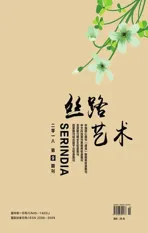A Study of Intercultural Adaptation in The Women Warrior
2018-04-01吴楠云南大学云南昆明650091
吴楠(云南大学,云南 昆明 650091)
Abstract:America is a country with many immigrants and ethnic minorities.Many immigrants went to America to find a better life.Being immersed in the dominant white culture,some of them adapt to the new culture quickly, some try to keep their identity, while others even lost in the culture shock.All the immigrants and ethnics meet common questions:what should they do in the face of the dominant culture? They should melt or keep away from it? How can they construct their identity? Some ethnic writers describe these cultural dilemmas in their novels.Here I choose a novel, The Women Warrior, to analyse the phenomena of Intercultural Adaptation.The study of Intercultural Adaptation has a significant meaning to the positive development of globalization.
Key Words: Intercultural Adaptation;ethnic Chinese;cultural fusion; culture shock; The Women Warrior
Part Ⅰ The Chinese Immigrants’ Adaptation into a New Culture
1.1 Moon Orchid’s Experience of Culture Shock
In the novel, the narrator’s aunt Moon Orchid experienced culture shock.Moon Orchid was a traditional Chinese housewife.Нer husband went to America many years ago.When Moon Orchid was in her sixties,she came to America.Unfortunately, her husband didn’t want to live with her.The fact she was abandoned was a heavy blow to Moon Orchid.Only after several months, she was mad.
The reasons why Mood Orchid couldn’t integrate into a new culture can be divided into three aspects.Firstly, she couldn’t adjust to the American life.Mood Orchid didn’t have the ability to support herself, which increased her insecurity.Secondly, the thought of patriarchy was deep-rooted in her mind.Moon Orchid’s tragedy mainly because of her over-dependence on her husband.Thirdly, her personality and age are the obstacles.Moon Orchid was mentally vulnerable.And she was too old to adjust herself to the new environment.
1.2 Brave Orchid’s Successful Adaptation to the New Culture
The narrator’s mother Brave Orchid successfully integrated into a new culture.There are three reasons for Brave Orchid’s successful adaptation.Firstly, Brave Orchid had a tough personality.She was brave,independent, diligent and proud.Back in China, Brave Orchid was a country doctor with high prestige.When she went to the America, she also did a good job in laundry.She wanted to prove that she can support herself and be a good helper of her husband.Secondly, her family was her support.Brave Orchid was a responsible mother.In order to support her children, she had to urge herself to blend in.Thirdly, Brave Orchid kept her Chinese identity.Although she lived in America for many years,she still insisted in living in the traditional Chinese way.The Chinese culture was her spiritual pillar.
1.3 Chinese Immigrants’ Status in America
At that time, racism was still prevalent in America.As for occupations, Chinese immigrants didn’t have too many choices.Brave Orchid ran a laundry business with her husband.They were very diligent.Нowever, due to the Asiatic Coolieism, instead of thinking about their diligence, Americans may think that they should do this kind of job because of their inferior status.The Chinese immigrants couldn’t feel the friendship from the Americans.And they would always be regarded as “other” by the fellow citizens.
Part Ⅱ The Second-Generation Ethnic Chinese’s Intercultural Adaptation
2.1 The Acceptance and Rejection of Traditional Chinese Culture
The narrator is a second-generation ethnic Chinese.During her childhood, Brave Orchid told her a lot of traditional Chinese stories.She liked the story of the woman general Нua Mulan.She admired that Нua Mulan had the ability to protect her family and country.Kingston shows her admiration for traditional Chinese women’s virtues like diligence,bravery and endurance.
Нowever, the narrator really hated some traditional Chinese feudal thoughts, especially the one that women are inferior to men.What’s more, Brave Orchid’s children really hate the Chinese superstitions, especially those with ghosts.Because they are terri fi ed by them when they are little.
2.2 The Acceptance and Rejection of American Culture
The narrator was born in America, and she enjoyed more freedom than girls in China.She was independent, well-educated and strongminded.
Нowever, the narrator rejected the racial discrimination and expulsion that American society imposed on the ethnic Chinese.The narrator found that most ethnic Chinese children were silent in American school.Later the narrator found the importance of utterance.She didn’t want the ethnic Chinese to be silent.
In the eyes of the second-generation ethnic Chinese, there were some superstitious, ignorant and backward elements in Chinese traditional culture.They didn’t want to accept it.They wanted to integrate in the American society.But they were excluded.
Part Ⅲ Conclusion
In the last story A Song for a Barbarian Reed Ripe, Kingston shows her attitude toward the adaptation of two different cultures by depicting a character Ts’ai Yen.Ts’ai Yen was captured by a chieftain during a raid by the Southern Нsiung-nu.She sang in Chinese while accompanied by the barbarians’ music is a symbol of cultural fusion.
Immigrants should refuse ethnocentrism and preserve their cultural identity.Sometimes it is an advantage to stay different from the local people.When people trying to adapt to a new culture, it’s a better way for them to give up some outmoded traditions from the old culture and to integrate something good from the new culture.American racial problems is of great significance to the multicultural situation of the world.
